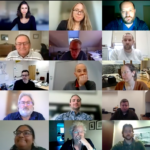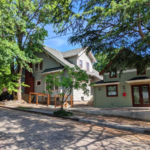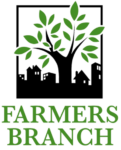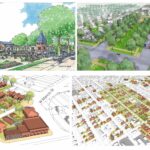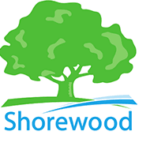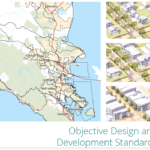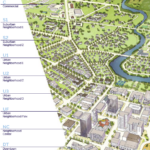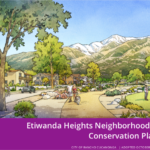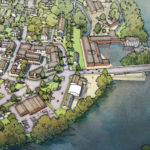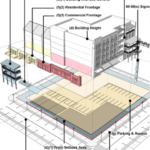FBC 101: The ABCs of Form-Based Codes DC
Summary
Monday, October 17, 2016
Urban Land Institute
2001 L Street NW
Suite 200
Washington, DC 20036
United States
Approval pending for 8 AICP CM, AIA CES, CNU-A
FBC101 is an intensive one-day class, in which participants learn how form-based codes are essentially different from conventional land use regulation and how they have evolved to solve many of the problems created by conventional zoning. The course provides an overview of the process of creating a form-based code, moving from an initial place-based community vision to an adopted code and beyond. Instructors combine lecture and classroom discussion with a hands-on exercise in observing community built form and shaping public space. Participants also learn about common misconceptions about form-based codes and the legal basis for form-based codes. This class is prerequisite for FBC 201 (urban design) and FBC 301 (code implementation). Participants who attend all three courses receive a certificate of completion from FBCI.
Click the tabs above to see agenda and instructors.
Lodging
AKA Washington, DC
Phone: 202.904.2500
Address: 1710 H Street NW Washington, DC 20006
The Capital Hilton
Phone: 202.393.1000
Address: 1001 16th St NW, Washington, DC 20036
Courtyard Marriott
Phone: 202.296.5700
Address: 515 20th St NW, Washington, DC 20006
The Westin Washington, D.C. City Center
Phone: 202-429-1700
Address: 1400 M St NW, Washington, DC 20005
Hotel Lombardy
Phone: 202.828.2600
Address: 2019 Pennsylvania Ave NW, Washington, DC 20006
Renaissance Washington, DC Dupont Circle Hotel
Phone: 202.775.0800
Address: 1143 New Hampshire Ave NW, Washington, DC 20037
Agenda
The following preliminary agenda is subject to change.
A final agenda will be ready one week before the start of the class.
Monday, October 17, 2016
| 8:00 – 8:30 AM | Registration and Light Breakfast |
| 8:30 – 9:00 AM | Welcome and Introductions |
| 9:00 – 10:00 AM | Form-Based Code Principles and Components: A Tool for Shaping Community Form and Character and Smarter Growth — Geoff Ferrell
The session provides an overview of the base principles of Urban Form, diverse project types, and code approaches. Topics covered: The need for zoning reform; form-based codes as the new paradigm for development regulation that puts form first and relegates use to secondary status. |
| 10:00 – 10:45 AM | Preparing a Form-Based Code — Lisa Wise
This session will explore the process of developing a shared community vision and translating it into an enforceable code. Topics covered: identifying problems with existing regulations; determining what kind of code the jurisdiction wants; establishing the structure of the code; developing/ reviewing the FBC components; and creating a public engagement process. Case studies will be presented. |
| 10:45 – 11:00 AM | Break |
| 11:00 AM – 11:45 AM | Legal Aspects of Form-Based Codes — Nancy Stroud
How form-based codes can streamline the permitting process and make development approvals more predictable and efficient, consistent with state law. Topics covered: The basis for form-based coding in statutory and case law; how legal issues in form-based coding vary from or are similar to legal issues in conventional zoning; and how form-based codes can minimize litigation. |
| 11:45 AM – 12:30 PM | Common Misconceptions about Form-Based Codes — Lisa Wise
The session will address common objections to form-based coding, many of which are based upon misunderstandings about this 30-year-old zoning technique. Topics covered: common misconceptions and how to address them for greater effectiveness; extent of flexibility in form-based codes; how they regulate the public realm; the degree to which they regulate design; their legal basis in a comprehensive plan or vision plan; and how FBCs differ from conventional zoning. |
| 12:30 – 1:15 PM | Lunch |
| 1:15 – 1:45 PM | Form-Based Codes and Real Estate Development — Chris Zimmerman
The developer is an integral part of the form-based coding process. The session will explore the developer’s role and contribution to the public/private partnership that makes FBCs successful. |
| 1:45 – 3:30 PM | Documentation and Analysis Exercise — All Instructors
In this exercise, participants will observe, document and discuss different contexts and levels of urbanism; how elements such as streets, frontages, setbacks and building forms become the foundation of a legally enforceable form-based code; and how to translate desired images into legally enforceable zoning codes and regulations of the public realm. Be ready to draw, understanding the details of built places and how they relate back to code content. |
| 3:30 – 3:45 PM | Break |
| 3:45 – 4:30 PM | Getting Ready for a Form-Based Code — All Instructors
Form-based codes are a new concept for many communities so often local planners need to build understanding and support before drafting and adopting a new code. In this session, the instructors will speak from their own experience across the country about steps local planners have taken to prepare citizens, political leaders and their own staff for the transition to an FBC. Topics to be addressed include: creating a community vision, getting political leaders on board, citizen education and support, asking consultants the right questions, and where to look for help. |
| 4:30 – 5:00 PM | Lessons Learned and Q&A — All Instructors and Participants
|
| 5:00 PM | Adjourn |
Instructors
FBCI draws upon national experts, including urban designers and planners with broad experience in all aspects of form-based coding.
 Geoffrey Ferrell is principal of Ferrell Madden Associates, an urban design and planning firm in Washington, D.C. Geoff is among the originators of the modern practice of form-based coding, building up the discipline through his work as an urban designer/code writer for Duany Plater-Zyberk Architects in Miami, as Director of Urban Design for the Treasure Coast Regional Planning Council in Florida, and at FM. His firm has created innovative codes for such diverse settings as the Columbia Pike corridor in Arlington, Va., a new transit station area in Farmers Branch, Texas, and special development districts in Peoria, Ill. Geoff is a Charter Member of the Congress for the New Urbanism and a founding board member of the Form-Based Codes Institute.
Geoffrey Ferrell is principal of Ferrell Madden Associates, an urban design and planning firm in Washington, D.C. Geoff is among the originators of the modern practice of form-based coding, building up the discipline through his work as an urban designer/code writer for Duany Plater-Zyberk Architects in Miami, as Director of Urban Design for the Treasure Coast Regional Planning Council in Florida, and at FM. His firm has created innovative codes for such diverse settings as the Columbia Pike corridor in Arlington, Va., a new transit station area in Farmers Branch, Texas, and special development districts in Peoria, Ill. Geoff is a Charter Member of the Congress for the New Urbanism and a founding board member of the Form-Based Codes Institute.
 Nancy Stroud is Of Counsel with Lewis, Stroud & Deutsch, P.L. in Boca Raton, Fla. She is a planning and development lawyer primarily representing local governments in efforts to create walkable and vibrant communities. She is a recognized expert in the preparation and implementation of form based codes. She was the legal consultant in the award-winning team that created the Miami21 form based code, winner of the 2010 Driehaus Form-Based Codes Award (Paul Crawford Distinction for a Ground Breaking Code), and the 2011 American Planning Association National Planning Excellence Award for Best Practice. Nancy writes and lectures on community development issues, and is co-author of a leading law school treatise Planning and Control of Land Development. She graduated from the University of North Carolina with a law degree and master of regional planning, and is certified by the American Institute of Certified Planners.
Nancy Stroud is Of Counsel with Lewis, Stroud & Deutsch, P.L. in Boca Raton, Fla. She is a planning and development lawyer primarily representing local governments in efforts to create walkable and vibrant communities. She is a recognized expert in the preparation and implementation of form based codes. She was the legal consultant in the award-winning team that created the Miami21 form based code, winner of the 2010 Driehaus Form-Based Codes Award (Paul Crawford Distinction for a Ground Breaking Code), and the 2011 American Planning Association National Planning Excellence Award for Best Practice. Nancy writes and lectures on community development issues, and is co-author of a leading law school treatise Planning and Control of Land Development. She graduated from the University of North Carolina with a law degree and master of regional planning, and is certified by the American Institute of Certified Planners.
 Lisa Wise, AICP, is President of Lisa Wise Consulting in San Luis Obispo, Calif. She is a CPA and planner with almost 25 years of professional experience in land use planning, housing policy, development codes, and finance. Lisa speaks regularly at state and national conferences and is considered an expert on comprehensive planning solutions, the economics of land use planning, and zoning ordinances and development codes. Lisa was the Project Director on several comprehensive and award-winning, long-range visioning and strategic planning projects including Soledad Downtown Specific Plan and Form-based Code, Benicia Lower Arsenal Mixed-Use Specific Plan and Form-Based Code, Grover Beach West Grand Avenue Master Plan, Ventura Downtown Specific Plan and Form-based Code, King City West Broadway Master Plan, and San Luis Obispo Economic Development Strategic Plan; and is currently Project Director on the Merced Bellevue Community Plan, specific plans for Alameda County and the Cities of Richmond and Vallejo, as well as Principal-in Charge of a multi-disciplinary team of industry experts conducting Pre-Development Entitlement Services for Port San Luis, Calif. Additionally, Lisa has a strong background in plan implementation including zoning and development code updates. Lisa graduated from the Master of City and Regional Planning Program at Cal Poly in San Luis Obispo in 2001. She resides is San Louis Obispo where she currently teaches at California Polytechnic State University as adjunct faculty in the College of Architecture and Environmental Design.
Lisa Wise, AICP, is President of Lisa Wise Consulting in San Luis Obispo, Calif. She is a CPA and planner with almost 25 years of professional experience in land use planning, housing policy, development codes, and finance. Lisa speaks regularly at state and national conferences and is considered an expert on comprehensive planning solutions, the economics of land use planning, and zoning ordinances and development codes. Lisa was the Project Director on several comprehensive and award-winning, long-range visioning and strategic planning projects including Soledad Downtown Specific Plan and Form-based Code, Benicia Lower Arsenal Mixed-Use Specific Plan and Form-Based Code, Grover Beach West Grand Avenue Master Plan, Ventura Downtown Specific Plan and Form-based Code, King City West Broadway Master Plan, and San Luis Obispo Economic Development Strategic Plan; and is currently Project Director on the Merced Bellevue Community Plan, specific plans for Alameda County and the Cities of Richmond and Vallejo, as well as Principal-in Charge of a multi-disciplinary team of industry experts conducting Pre-Development Entitlement Services for Port San Luis, Calif. Additionally, Lisa has a strong background in plan implementation including zoning and development code updates. Lisa graduated from the Master of City and Regional Planning Program at Cal Poly in San Luis Obispo in 2001. She resides is San Louis Obispo where she currently teaches at California Polytechnic State University as adjunct faculty in the College of Architecture and Environmental Design.
To see all FBCI instructors, visit our instructors page
Early Registration Discount!
Register by October 7 for a $75 discount.
Discounts also are available for large-group registrations.
Contact FBCI for more information.
Standard registration:
By October 7 — $400
After October 7 — $475
Public/nonprofit:
By October 7 — $250
After October 7 — $325
Payment by credit card (MC/Visa) or by check.
Please mail checks to:
Form-Based Codes Institute, Inc.
P.O. Box 65055
Washington, DC 20035
FBCI appreciates the support of:
Location
Urban Land Institute
2001 L Street NW
Suite 200
Washington, DC 20036





